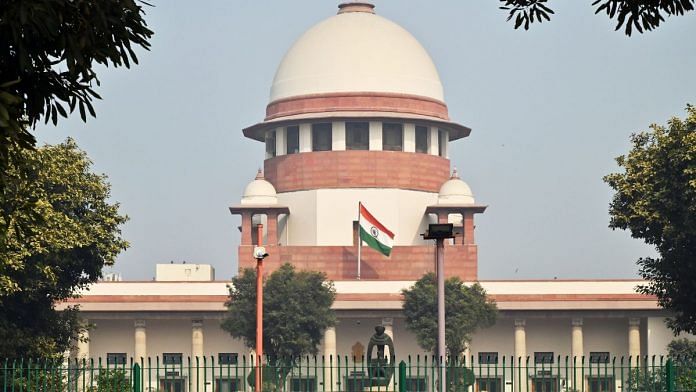New Delhi: The central government has no intention of amending any of the legal provisions applicable to the Northeast and other regions of India, Solicitor General Tushar Mehta informed the Supreme Court Wednesday. What he was specifically referring to was Article 371 of the Constitution, which bestows “special status” on 12 states, including Manipur, Assam, Nagaland, Arunachal Pradesh, Sikkim, and Mizoram.
The subject of Article 371, which makes several region-specific accommodations, came up in court when advocate and Congress leader Manish Tewari expressed “apprehensions” that the central government might abrogate the special provisions for the Northeast in the same manner as it did with Article 370, which gave special status to Jammu and Kashmir.
An SC bench led by Chief Justice of India D.Y. Chandrachud is currently hearing a batch of petitions raising a challenge to Article 370’s abrogation in 2019 and subsequent bifurcation of Jammu and Kashmir into two Union territories — J&K and Ladakh.
At the time of the split of Jammu & Kashmir too, Union Home Minister Amit Shah had stated to the media that “Article 371 will not be touched”.
Mehta reiterated this stand Wednesday, pointing out to the court “the difference between a temporary provision like Article 370 and special provisions under Article 371”.
ThePrint explains Article 371 of the Constitution and the different special provisions and accommodations it provides to different states.
Also Read: Article 370 hearing: No power in Constitution that lets Centre extinguish a state, Sibal tells SC
Different ‘special provisions’ for different states
Article 371 and its clauses come under Part XXI of the Constitution, which provides for “temporary, transitional, and special provisions” for various states.
Both Article 370 and Article 371 have been part of the Constitution of India since its formation in 1950. While Article 370 gave special status to J&K, Article 371 provided special provisions for Maharashtra and Gujarat.
Clauses pertaining to other states under Article 371 were incorporated later via amendments.
In Nagaland, Article 371A was introduced following a 16-point agreement between the central government and the Naga People’s Convention (NPC) in 1960. The agreement led to the creation of the state of Nagaland in 1963, and Article 371A granted the state’s people extraordinary powers of governance.
Parliament cannot legislate in Nagaland on matters of religious or social practices, customary law, procedure, civil or criminal justice, ownership, and land, without the concurrence of the state assembly.
In Mizoram too, Parliament cannot legislate on such matters unless the assembly so decides due to the special provisions under Article 371.
Article 371B, applicable to Assam, allows the President to constitute a committee of the state legislative assembly consisting of members elected from the tribal areas of the state and such other members as he/she may specify.
In Manipur too, Article 371C provides for the constitution of a similar committee of elected members from the state’s tribal areas. It also provides for the governor to make an annual or “on request” report to the President as to the administration of the state’s hill areas.
Sikkim, and Arunachal Pradesh, too, have such special status ascribed to them via Articles 371F, and 371H, respectively.
In the Lok Sabha, one special seat has been allotted to Sikkim, the member for which is elected by the Sikkim assembly.
In Arunachal Pradesh, the governor is accorded the special responsibility to maintain law and order.
Similarly, special provisions under Article 371 are applicable to Maharashtra, Gujarat, Goa, Karnataka, Andhra Pradesh, and Telangana.
In Maharashtra and Gujarat, for instance, the governor has been given the special responsibility to ensure region-specific development, technical and vocational education, and employment opportunities.
In Andhra Pradesh, clauses D and E under Article 371 empower, among other things, the President to provide for equitable opportunities and facilities for people belonging to different parts of the state in matters of public employment and education.
In 2014, when Telangana was created, Article 371D was extended to the state by the Andhra Pradesh Reorganisation Act.
Article 371J contains special provisions for Karnataka, while Article 371I provides that the Goa assembly is to consist of not less than 30 members.
Article 370’s restrictions on the sale of property are also part and parcel of various provisions under Article 371.
For instance, non-residents are prohibited from buying land in Nagaland. This is the case in Mizoram too, excepting industries by the private sector.
In Sikkim, the state government has been given all rights of ownership.
(Edited by Nida Fatima Siddiqui)
Also Read: ‘Marriage can’t take away identity’: SC order scrapping ‘discriminatory’ tax law for Sikkim women



